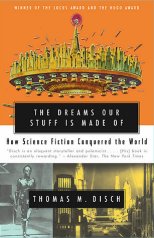
The Dreams our Stuff Is Made of
Thomas M. Disch
256 pages, including notes and index
published in 1998
This is a book with serious problems. The subtitle, How Science Fiction Conquered the World, and the introduction promise a serious study of the cultural impact of science fiction on the world and American society. However, the rest of the book does not live up to this promise. It is not as much that this is a failed attempt, but more so that the attempt was not even made in earnest.
In his foreword, Disch tells us that:
It is my contention some of the most remarkable features of the present historical moment have their roots in a way of thinking that we have learned from Science Fiction-to wit: the razing of the Berlin wall; the rise of millennial cults with homicidal agendas; Oliver North's testimony before congress and his campaign for a senate seat; Madonna's wardrobe and Sinead O'Connor's hairstyle; celebrity murder trials; compassion "burnout" for refugees in Rwanda; the deaths of the Challenger astronauts; toxic waste cover-ups; and much too much more.
Which is a slightly more longwinded way of saying that we are living in a science fiction world; a claim that has been made by various people since August 6, 1945. But what Disch asks us to believe is that we not only live in a world we recognise from science fiction, but that science fiction is largely responsible for how this world came about. Nowhere in The Dreams our Stuff Is Made of does Disch attempt seriously to prove this. Instead, we have a series of anecdotes about science fiction seeping into the wider world and a sort of "guilt by association" for science fiction in the way various millennial cults have made use of science fiction imagery.
That The Dreams our Stuff Is Made of does not live up to its purpose is only one of its problems. It is sloppily written, filled stupid mistakes of the kind that could've been avoided by a quick browse through The Encyclopedia of Science Fiction. For example, Orson Scott Card's first novel was not Ender's Game, as Disch apparantely believes.
Throughout the entire book, Disch is also fond of making sweeping statements for which he doesn't bother to provide evidence, like the claim that:
Science fiction is one of the few American industries that has neer been transplanted abroad with any success. Japan may have zapped Detroit, but most sci fi still bears the label "Made in America" and the future represented by SF writers continues to be an American future. It isn't only Oz that is Kansas in disguise; the whole Galactic Imperium is simply the American Dream (or Nightmare) writ large.
Which is simply not true. As he himself points out in later chapters, the first two real science fiction writers were H. G. Wells, an Englishman and Jules Verne, a Frenchman! There are a huge number of British science fiction writers who are undoubtly influenced by US science fiction, but at the same time it is clear to see that these same writers are working within their own tradition.
More embarassing, is his attitude towards other science fiction writers. Every science fiction writer other than Disch is talked about negatively. Through catty anecdotes it is revealed that J. G. Ballard is a drunk as well as a reckless driver and Theodore Sturgeon used grass and invited Disch in for a threesome with his wife. And these are writers Disch seems to admire. Somebody like Ursula LeGuin, whom Disch seems to hate with an unabiding passion, comes in for far heavier criticism: "One does not read Le Guin for fun, or excitement, or wild ideas, nor yet for what is often accounted SF's raison d'etre, a sense of wonder". Sufficient to say, this is somewhat of a minority view.
So is this book a total writeoff? Not entirely, though it is more bad than good. Disch, despite his problems, is an engaging writer and he can sweep you along for pages on end before you once again encounter a claim so mindboggingly stupid as to break your concentration. He at times is even capable of surprising insights. For example, his take on Star Trek as the utopian office of the future. On the whole however, this book is undermined by its own ambitions. It does not live up to expectations and it would've worked better if this was presented as a series of essays on the history and cultural role of science fiction, rather than as a serious near-academic study. The fact checking on this should also have been improved. In conclusion, caveat lector.
